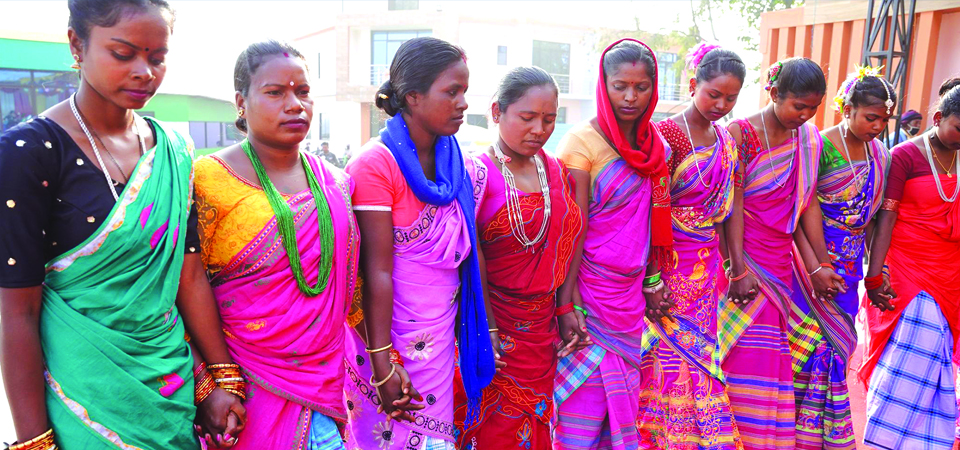Worry over cultural decline of Santhals

By Hari Prasad Koirala
Urlabari, Feb. 4: The Santhals, who have been living in the plains of eastern Nepal since historic times, are in the threat of extinction.
Santhal leaders expressed concern over the declining state of their caste, religion (called Vidin Dharma) and traditions during the conclusion of their biggest festival 'Soharaya'.
The occasion was marked with a large cultural gathering in Urlabari Municipality – 8 where they worried that the Santhal faith, language and customs were being encroached upon.
President of the Santhal Society Urlabari Musui Hemaram exclaimed, “Our children have forgotten their mother tongue. They have no knowledge about our festivals. The government has prohibited us from hunting in the forest with bows and arrows. In fact, we are not even allowed to enter community forests. Our customs and practices can be seen only at festivals.”
Santhals are mainly hunter-gatherers who raise livestock. Only a few practice agriculture. However, modernisation and changes in lifestyle have led many from the community away from these practices.
Similarly, according to Shiva Raj Kisku, traditional head of the Urlabari Village known as Majhi Hadam, many Santhals are also becoming landless. “We came to the Terai when there were no settlements here. We cleared the forests and settled here. But now, of the 225 Santhal families in Urlabari, 125 are landless,” he informed. He stated that this was because of lack of education and understanding. “Members of our community sold land to people migrating from the hills and as a result, became landless themselves.”
Kisku shared that some landless Santhals lived on the banks of the rivers while others tilled the land their forefathers sold as contract workers.
Ritthe Murmu of Kanepokhari Rural Municipality – 3 opined that costly festivals were also a reason for the Santhals poor economic condition. “We have to celebrate Soharaya lavishly, even if it means taking loans. Many sold their property to have enough money for long celebrations.”
Foreign employment has also taken a toll on the Santhal’s way of life. The absence of young working-age men in the villages has made it difficult for seniors to hand over their knowledge to the new generation. “That is why we have been organising collective celebrations for festivals in recent times. We want to facilitate the generational transference of culture,” Kisku said.
With men working abroad, Santhal women have also been taking the initiative to preserve their culture.
Recent News

Do not make expressions casting dout on election: EC
14 Apr, 2022
CM Bhatta says may New Year 2079 BS inspire positive thinking
14 Apr, 2022
Three new cases, 44 recoveries in 24 hours
14 Apr, 2022
689 climbers of 84 teams so far acquire permits for climbing various peaks this spring season
14 Apr, 2022
How the rising cost of living crisis is impacting Nepal
14 Apr, 2022
US military confirms an interstellar meteor collided with Earth
14 Apr, 2022
Valneva Covid vaccine approved for use in UK
14 Apr, 2022
Chair Prachanda highlights need of unity among Maoist, Communist forces
14 Apr, 2022
Ranbir Kapoor and Alia Bhatt: Bollywood toasts star couple on wedding
14 Apr, 2022
President Bhandari confers decorations (Photo Feature)
14 Apr, 2022










